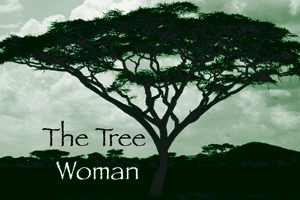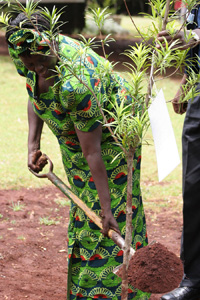Wangari Maathai to lecture on campus
By Josh SchonwaldNews Office
  Wangari Maathai planting a tree at the Outspan Hotel, Nyeri, Kenya, to mark the launch of her autobiography, Unbowed. Photo by Wanjira Mathai (2006). | |
Environmentalist, feminist, peace activist, veterinarian, professor, mother, member of parliament, Nobel Prize winner — Wangari Maathai is all of these things.
But among her dizzying range of accomplishments and accolades, perhaps Maathai’s most recognizable title is simply “the tree woman.” Maathai will speak at Rockefeller Memorial Chapel at 5 p.m., Sunday, Sept. 23, to kick off this year’s Chicago Humanities Festival.
In 1977, Maathai came up with an idea that she thought would help the environment and improve the quality of life of Kenya’s women: get the women to plant trees together. This seemingly simple idea has grown into one of the world’s most successful environmental movements — over the past 30 years, more than 30 million trees have been planted across Kenya by more than 100,000 women. By employing the approach of planting trees in groups of 1,000 or more, “green belts” began to reclaim the endangered ecosystems of Kenya while curbing soil erosion.
The 2007 Chicago Humanities Festival theme, “The Climate of Concern,” will focus on the specter of global warming. For the first time in its 18-year history, the festival will include collaborative programming in Hyde Park. Maathi’s lecture, presented in partnership with the University, will highlight a series of sustainability events on campus and in the community.
During her lecture on campus, Maathai will discuss her memoir, Unbowed, a detailed account of her life, which began in a small village in the Nyeri region of Kenya. The first woman in East and Central Africa to earn a Ph.D., Maathai taught veterinary anatomy at the University of Nairobi in the 1970s. In the late 1970s, she founded the “green belt” movement and became an international leader and the first African woman to win the Nobel Peace Prize. Maathai, who will be introduced by President Zimmer, will describe the origins of her activism during her lecture.
For the past four decades, Maathai has been as active in women’s issues as she has in environmental issues, having served for six years as chairman of the National Council of Women of Kenya from 1981 to 1987. Her husband, the Kenyan politician Mwang Mathai, who she had married in 1969, divorced her, saying he was unable to control her because she was too strong-minded for a woman. The judge, who had ruled in her husband’s favor, then jailed her for speaking out against him. He decreed that she must drop her husband’s surname, and in defiance, she chose to add an extra “a” instead.
Maathai, whose activism also reached into the political arena, was imprisoned several times for demanding multiparty elections and an end to political corruption during the regime of President Daniel Moi.
After her own aborted run for Kenya’s presidency in 1997, Maathai was elected to parliament in 2002. A year later, she founded the Manzingira Green Party of Kenya and was appointed Minister for Environment, Natural Resources and Wildlife.
In 2004, the Nobel committee awarded her with its Peace Prize, praising Maathai for her work on behalf of women and the environment, and for drawing both national and international attention to political oppression. “She has served as an inspiration in the fight for democratic rights and has especially encouraged women to better their situation,” the Nobel citation noted.
Tickets for Maathai’s lecture are free. To reserve tickets, please contact the Chicago Humanities Festival’s ticket office at (312) 494-9509.
For more information about the University’s forthcoming series of seminars and lectures on issues related to global sustainability, please visit: http://humanities.uchicago.edu/sustainability/maathai/.
![[Chronicle]](/images/sidebar_header_oct06.gif)